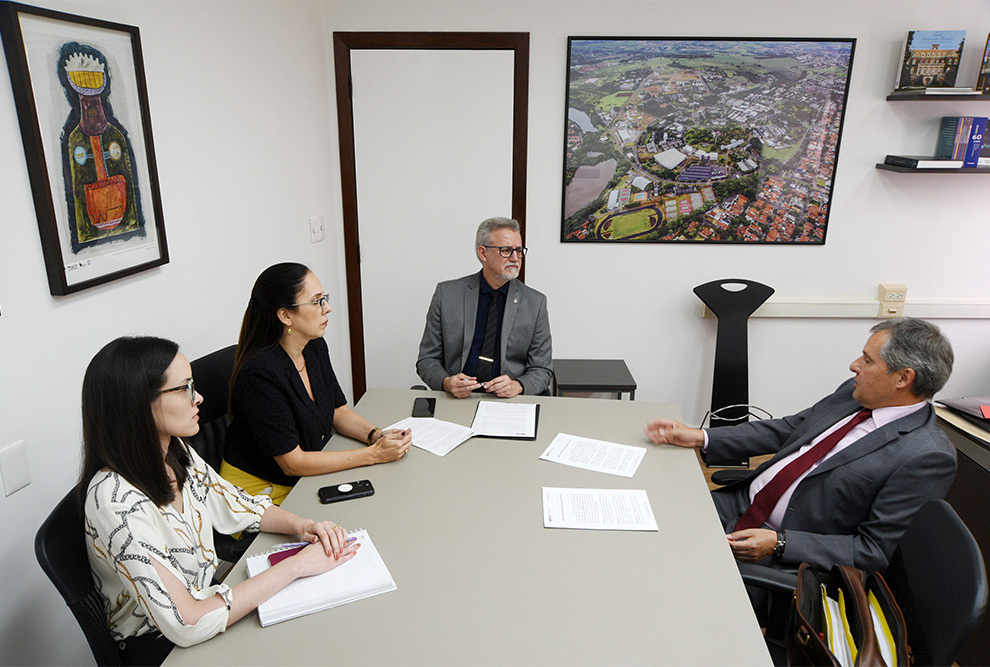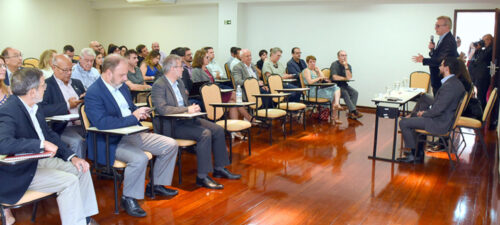Unicamp signed a Conduct Adjustment Term (TAC) with the State Public Prosecutor's Office in Campinas, this Monday (13), for the implementation of an electronic system for monitoring the presence of University employees. The agreement was signed by the rector of Unicamp, professor Antonio José de Almeida Meirelles, by the 15th prosecutor of Campinas, Angelo Santos de Carvalhaes and by the attorney general of Unicamp, Fernanda Lavras Costallat Silvado.
Initiated last November, with the structuring and planning phase, the first stage of the project ends on July 31 of this year. In total, there will be four implementation phases. The expectation is that the process will be completed throughout the University by June 30, 2024, with the possibility of extending the deadline for another six months.
The proposal for signing the TAC was approved by the Board of Directors (CAD) in the first week of October last year. Unicamp has just over 8,4 servers, in different types of journeys.
The first phase foresees the discussion of the project with the representative entities of the servers, the definition of the technological solution to be used and the elaboration of the implantation schedule in each one of the phases.
In stage 2 — which takes place between August 1st and December 31st of this year —, the implementation of the electronic point in the Central Administration — Office of the Dean (GR), General Coordination of the University (CGU), Pro-Rectories and Executive Boards . In this same phase, it is foreseen the implantation in part of the area of Health — in the Hospital of the Woman-Caism, in the Center of Health of the Community (Cecom) and in the Gastrocentro (Center of Diagnosis of Diseases of the Digestive Apparatus).
Stage 3 foresees the final implementation in the Central Administration and in the health area, covering the Hospital das Clínicas, the Blood Center and other organs. The fourth and final stage foresees the implementation in the Teaching, Research and Extension Units (institutes and colleges), Centers and Research Nuclei.

correct and safe way
“We, from the MP, have been fighting for the implantation of the electronic point, because this is the most correct form of control, in addition to being safer”, argues prosecutor Angelo Carvalhaes. “That old time card doesn't apply anymore”, he evaluates.
The prosecutor says that the measure does not affect the autonomy of the University. “The Public Ministry has demanded this type of control not only from the University, but from many other public bodies”, he guarantees. “We were able, for example, to implement it at the Municipal Hospital Mário Gatti (in Campinas)”, he exemplifies. He also recalled that the TAC leaves the decision regarding the categories that will be subject to regulation to Unicamp.
“It is important to note that the Public Prosecutor's Office has, as one of its attributions, to supervise the way public institutions work”, commented the rector of Unicamp. “And because it was triggered for reasons well before our management, by the way, the MP has now suggested this conduct adjustment term to the university and requested the updating of the forms of monitoring presence at work”, he reports.
“We would not be able to justify, even from a legal point of view, a refusal to sign this adjustment term. For us, this does not harm university autonomy. We do not see autonomy as complete independence. Unicamp is part of the state's public institutions, financed by tax resources and, therefore, has obligations to carry out activities and fulfill functions that are in accordance with legal requirements”, ponders Meirelles.
“Autonomy is mainly defined by the decision-making power that the institution has in matters of teaching, research, extension and the application of its own budget, which corresponds to a fixed percentage of ICMS collection”, concludes the dean.
Agility of the control process
The Deputy Director of the General Directorate of Human Resources (DGRH), Everaldo Pinheiro, said that the only change brought about by the TAC is the form of monitoring. “As DGRH, we are just changing the way attendance is done, which already happens. From now on, it will be done with the electronic point, but nothing will change in relation to the work process that already exists. Only the form of registration changes”, says the director. “The new system will speed up the control process and, with that, make the management of work teams more dynamic”, concludes Pinheiro.
Originally published on Unicamp website





